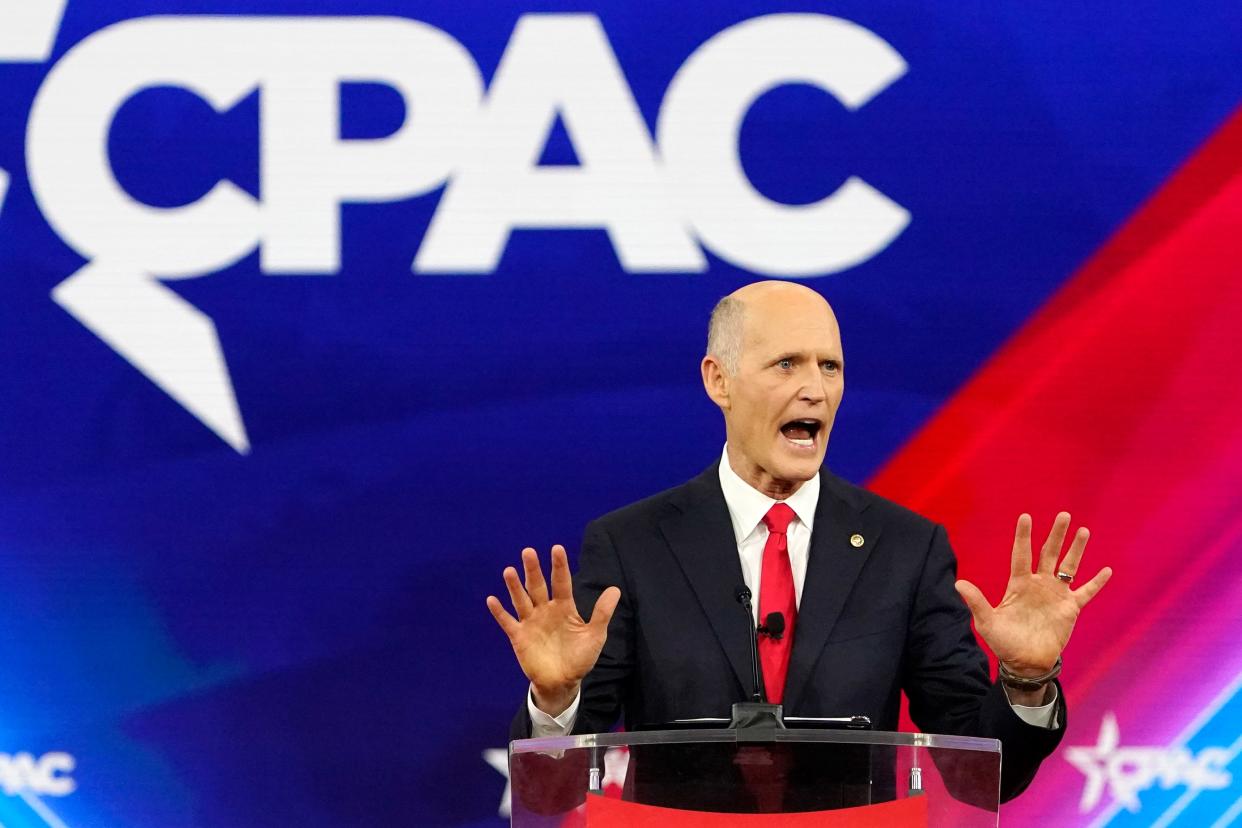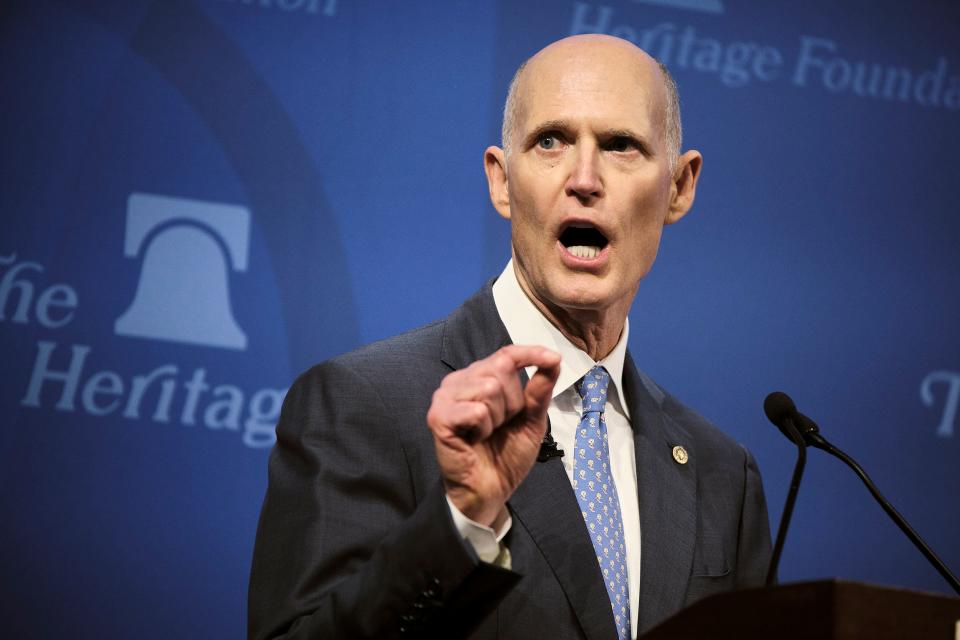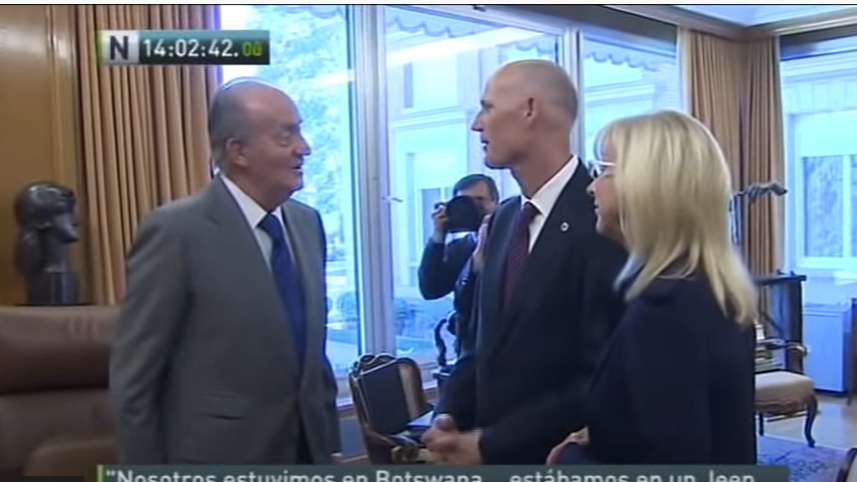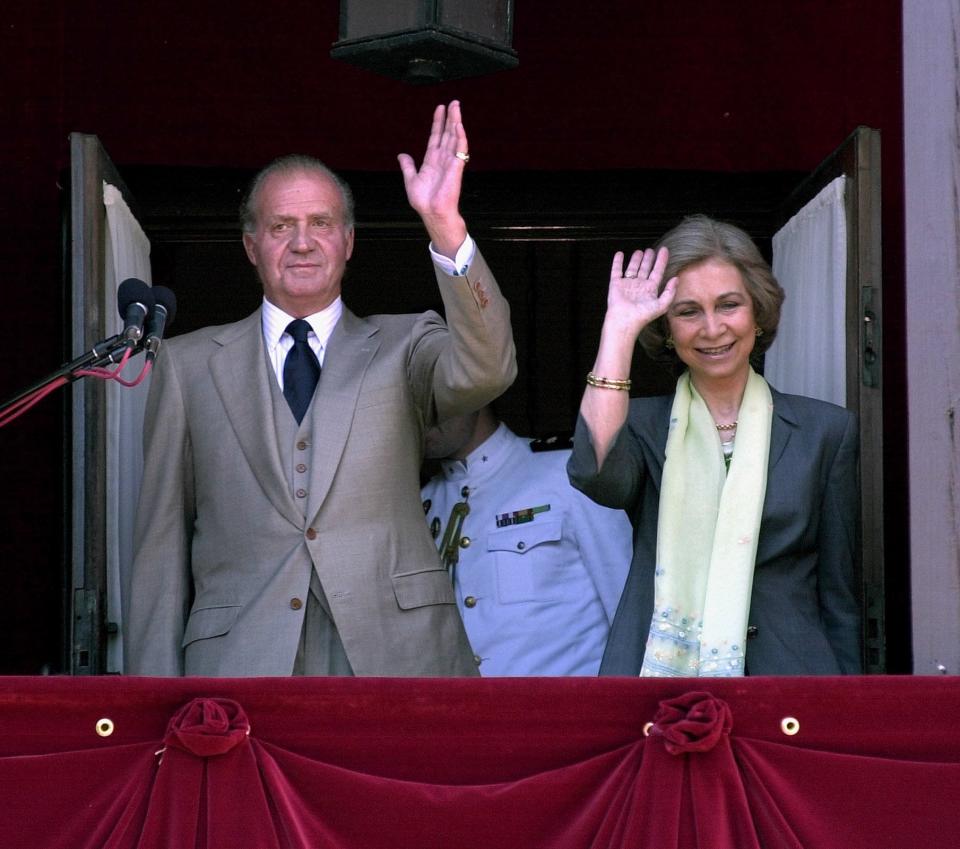Rick Scott, the king of Spain, the elephant — and me: A political tale

- Oops!Something went wrong.Please try again later.
- Oops!Something went wrong.Please try again later.
- Oops!Something went wrong.Please try again later.
Rick Scott, the king of Spain, the elephant — and me: A political tale
Over a bowl of sautéed mussels a decade ago this month, I leaned over and sheepishly made a confession to the diplomat seated next to me.
"I was the one who brought up the elephants," I told Spain's consul general in Miami. Ambassador María Cristina Barrios was the guest of honor at the June 2012 dinner with South Florida business representatives who had been in Madrid, along with then-Gov. Rick Scott, for a trade meeting the month before.
Barrios heard my story, then let out a hearty laugh.
"We just had another meeting with the foreign ministry today and again everyone again was dumbfounded on where this came from," she said. "Now I can tell them it was the gallego journalist from Florida who is to blame."
Rick Scott, King Juan Carlos, the elephant — and me
It all began with a facetious remark, a reporter ploy to buy time with a politician heading for the exit, that unwittingly set the stage for a cross-Atlantic uproar just weeks later.
"Just don't mention the elephants," I quipped.
The politician with whom I sought to prolong a conversation was Gov. Scott. And the firestorm of ridicule? It blew up weeks later in May 2012 after Scott's audience with King Juan Carlos of Spain — a meeting in which the governor went ahead and talked up the elephants.
Oh, and did he ever in that rendezvous in Spain's capital.
The encounter between the governor and monarch would provide fodder for pundits and late night comedians in Iberia and in the United States. Ten years later, the cringe-worthy meeting is largely forgotten, but its reflection in the rearview mirror is a telling juncture in Florida and European politics.
Finding family: How I found my family in Spain with help from a teacher, a newspaper and a bull
Gov. Rick Scott: Gov. Rick Scott puts Spanish king on spot
It revealed how 15 minutes in the Warholian spotlight can over the long-term play out far differently than snap judgements in media coverage might suggest, especially in a 24/7 news cycle spanning two continents.
That awkward and fumbled conversation, in 20/20 hindsight, turned out to be a crossroad for disruptive political challengers and establishment elites, in America and Europe alike.

Rick Scott was original GOP establishment, political disruptor
At the moment I offered up my sardonic advice on elephants, Scott was still a relative unknown on Florida's political stage — let alone beyond the Sunshine State.
Scott had no political experience when he stepped in to challenge the odds-on favorite for the Republican Florida gubernatorial nomination in 2010. His opponent, William McCollum, was the establishment.
The at-the-time Florida attorney general, McCollum previously had served 10 terms in the U.S. House of Representatives. He had a starring role as an impeachment prosecutor in President Bill Clinton's 1999 U.S. Senate trial, which was sparked by an infamously stained blue dress.
Scott was mostly known in Florida for his stint as CEO of Columbia/HCA, a hospital company that had defrauded Medicare — and for pleading the Fifth Amendment more than 70 times during a deposition for an unrelated civil suit citing the government's fraud investigation into the company.
In that run for governor a dozen years ago, Scott skipped newspaper editorial boards and the type of press conferences and events that allow for scrutiny. Instead, he largely campaigned in reddening tea party bastions, most notably The Villages community north of Orlando.
Scott upset McCollum to grab the nomination, and later won the general election by a razor-thin margin. Then he had to govern, which is what led him to engage Florida newsrooms during his first year or so in office.
That's how I ended up in the room with him a decade ago.
I was there to ask not just about his policies as governor. That issue menu included a controversial overhaul of the state's unemployment benefits system that critics argued would leave Floridians vulnerable in the next economic crisis and that his successor, Ron DeSantis, would deride as a "jalopy."
But I was also there to ask Scott just what did he know, and when did he know it, about the Columbia/HCA fraud scandal in the late 1990s and the $1.7 billion fine the company paid — all on his watch.
Rick Scott: "We didn't shoot an elephant, but we got chased by one"
As Scott exited the meeting with reporters that afternoon, I managed to make eye contact.
"Governor, are you looking forward to your Spain trip?" I asked Scott about his impending trade and business mission.
Scott stopped, his eyes widened and he smiled broadly.
"Yes, and I just found out I am going to meet the king," he said. "I am really looking forward to that."
"Just don't mention the elephants," I said.
Scott looked perplexed. And I explained that the king, on a safari in Botswana a few months earlier, had reportedly shot and killed a pair of elephants.
"I didn't know that!" Scott exclaimed.
Scott wasn't aware of it, but Juan Carlos' loyal subjects in Spain certainly were, and many were infuriated by it.
The public learned of — and became aghast by — the hunting expedition via an Internet-posted snapshot. The image had Juan Carlos standing triumphantly, rifle cradled in his left arm, with the massive dead animal perched and posed against a tree, held up by its trunk ivory tusks around the bark. The photo unsurprisingly further inflamed opinions.
Making matters worse, the king busted a hip on the trip and had to be flown back to Spain.
Somehow, this all appeared to be a revelation to the governor. He proceeded to recall, as we walked toward the elevator, how he and his spouse, Anne Scott, had been chased by an elephant while on their own safari in Botswana.
An animated Scott told how the couple were in a jeep when a bull elephant charged at them. As the jeep sped away, Scott told me, the elephant got close enough to prompt Florida's first lady, seated in the back, to wedge herself between the front seats, just in case.
"We didn't shoot an elephant," he said, reveling in the telling of one of those it's funny looking back now stories, "but we got chased by one."
And then he was gone, whisked away in a black SUV before I could ask him about Columbia/HCA. And before I could tell him that the king's encounter with an elephant was no laughing matter, but one that had elicited scorn, rebukes and a forced apology by a chastened and embarrassed King Juan Carlos.
Rick Scott led trade delegation to Spain. That was the plan, anyway.
Several weeks later, I was in my office when a colleague poked his head in the doorway.
"It's your fault," he said laughing. Then, another colleaguee emailed me a handful of links to videos on YouTube from Spanish television programs.
The first link was a clip of the conversation between the king and governor just days before at the Zarzuela palace in the Spanish capital. In the video, Scott entered the royal study, or greeting room, and before even greeting the king, said: "I've ridden elephants, I've never tried to shoot one."
The monarch looked flabbergasted, but still mustered up an uncomfortable smile and chuckle. Scott continued.
"We were in Botswana and we were in the jeep and an elephant started chasing the jeep," the governor said with a broad smile, and then turning toward Anne Scott standing next to him. "My wife is in the back part of the jeep and she wanted to get in the front of the jeep."

"Scared to death," Anne Scott is heard on the video telling Juan Carlos. "I needed you in the jeep with me."
At that point the king turned away from Florida's first couple, extending his hand to greet another guest, later identified as Pepe Fanjul of Florida Crystals in West Palm Beach. He then briefly chatted up an accompanying official while Scott stood as a bystander.
A fleeting, awkward pause followed before Scott interjected to ask Juan Carlos just how he had broken his hip on that fateful safari. The monarch replied he simply fell out of bed.
"Really? You need a better story," Scott said, laughing as if needling a buddy at a tapas bar over a cup of sangria. "You gotta have a story that you were riding something to shoot the elephant and you fell off."

Spanish, U.S. media derided Rick Scott's chat with King Juan Carlos
The "entire encounter was an embarrassment," began a Spanish news segment on the meeting between Scott and King Juan Carlos. "Before he even said hello," the anchor sniped, "[Scott] had cornered Don Juan Carlos with an interrogatory on Botswana."
The show's host chided the governor and his staff declaring: "Well, it's clear that no one gave the governor of Florida basic advice on how to talk to a monarch."
Another newscaster noted the king's face "was changing colors" as he looked around for someone else to chat with in a "plea for help." He then mocked Scott saying the governor's campochano style, or attempt at folksiness, was an over the top flop.
On late night shows, comedians ridiculed Scott for thinking the king's Botswanan impropriety was a joking matter. And on and on it went that week.
It wasn't much better on some networks on this side of the Atlantic.
A Gannett Florida News report at the time concluded: "Apparently, Florida Gov. Rick Scott decided not to ignore the elephant in the room during his visit in Madrid with the Spanish king this week."
Chris Matthews, former host of MSNBC's Hardball show, told viewers that "Rick Scott had become the laughingstock of Spanish TV."
True enough, Matthews and others would not be expected to have been kind to Scott on most issues. But in Madrid, Scott deployed damage control in a self-aware signal that he realized his glibness had been poorly received by Spaniards.
"He's a wonderful person and I really was appreciative that he gave me the time to meet with him," Scott said of the monarch as experts in royal protocol called him out for an "enormous failure of protocol."
The governor added: "I heard he hurt his hip. I asked how his hip was. He said his hip is getting better, and that was my concern."
Arriving in Miami, Scott issued an apology.
"If I did anything . . . wrong I completely apologize," he said.
King abdicates, far-right parties on rise across Europe in past decade
Elephant-gate had largely blown over for Scott by the time he returned to the United States. But not so for the Spanish monarch beleaguered, too, by mushrooming allegations of financial wrongdoing involving the royal family.
On June 19, 2014, the king abdicated the throne, and was replaced by his son. Time.com concluded that "A Dead Elephant Was the Beginning of the End for Spain's King."
It was an ignominious end for a monarch who was widely respected as a key proponent of European and global democracy in the latter decades of the 20th Century.
Juan Carlos assumed the throne after the death of Spain's fascist dictator Francisco Franco. Rather than continuing Francoist authoritarianism, Juan Carlos helped lead a transition to democratic rule in the late 1970s.
In 1981, he faced down a coup attempt by fascists. In 2007, he famously told Venezuelan socialist strongman Hugo Chávez to "shut up" during a summit.
Coincidence or not, a wave of right-wing activism has been rising in the ensuing years across Europe, all the way to the former Iron Curtain nations.
In Spain, the far-right Vox party won enough votes and seats in February's election to enter into a coalition government in the northwestern Castilla y León region. In Hungary, nationalist Prime Minister Viktor Orbán won re-election in April.
Even in Germany, which has repulsed and rejected extremist politics for decades, the nationalist Alternative for Germany party established in 2013 ranks among the largest opposition parties represented in the country's parliament.
When French President Emmanuel Macron defeated far-right candidate Marine Le Pen last month, the continent reacted with a sigh of relief more so than joyous cheers. Le Pen's party, however, won a historic number of seats in France's parliamentary elections on June 19.
Tea party original Rick Scott aligned with Trump's "America First" agenda
Five months after Juan Carlos abdicated, Scott won a second term as Florida's governor. Four years later, he edged out incumbent Democrat Bill Nelson in a hard-fought 2018 U.S. Senate race.
Scott is solidly aligned with former President Donald Trump's "America First" agenda. In January 2016, before the primary season, Scott wrote an op-ed in USA Today in which he praised Trump as a candidate who had "America's pulse" in sensing the nation's frustration with the state of government and economics.
In the hours after the Jan. 6 attack on the U.S. Capitol, a shocking event being investigated by a U.S. House committee as a potential coup attempt, Scott voted against accepting Pennsylvania's electoral votes.
Earlier this year, he turned further to the hard-right with an 11-point plan that would eliminate federal entitlement programs like Social Security and Medicare unless Congress reauthorizes them every five years, require even the lowest-income Americans to pay taxes and reduce the federal workforce by 25% in five years.
Scott's plan received immediate bipartisan push back. GOP Senate Minority leader Mitch McConnell rebuffed the effort saying, "We will not have as part of our agenda a bill that raises taxes on half the American people, and sunsets Social Security and Medicare within five years."
That remains to be seen, but the chatter all around Scott speculates on whether he will challenge McConnell for Senate leadership after the November midterms, or whether he is laying the groundwork for a 2024 White House campaign.
And, by the way, Scott is chairing the National Republican Senatorial Committee, which raises money for this fall's GOP take-back-the-Senate campaigns. As of early this year, the Republican committee had outraised its Democratic Party rival by almost 20%.
You know what they say about politics, money talks.
And the former king? He has been living in quasi exile off the coast of Abu Dhabi.He returned to Spain last month — but only for vacation.
To my knowledge, no one mentioned the elephants.
This article originally appeared on Palm Beach Post: Rick Scott derided a decade ago over elephant remark to King of Spain

